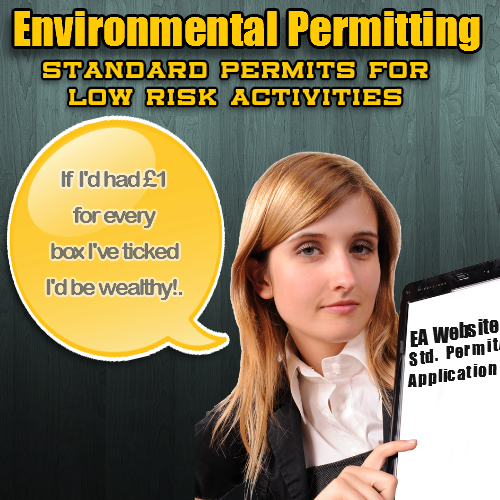This is the story of how the old UK “Waste Management Licensing” regulations were repealed and EU IPPC regulations were implemented and called “Environmental Permitting” in the UK.
“One Stop Shop” for UK Environmental Regulation
A so-called, “One Stop Shop” for the environmental regulation of sites operated by the waste management industry in the UK, was introduced in 2008 in the UK for Environmental Permits by Defra UK, and similar simplification measures were adopted in Wales and Scotland.
Until this act of regulatory simplification, waste facility operators may have needed to apply separately under several different regulations which applied to their activities, depending on their business operations.
Environmental permits (EPs) were the new buzz-word in environmental regulation in those days, and the concept was welcomed by the waste management industry because they simplified a complex array of old regulations.
New Permits Welcomed for Simplifying Previous Compliance Burden
The UK environmental regulations were simplified for the first time in years with the advent of Environmental Permitting, for once the government did well to reduce the red-tape. Unfortunately, this fact went largely unreported other than in the technical press, and the government and EU continued to be criticized by the media for what was seen as an ever-rising burden of the complexity of regulation, by many politicians.
The Environmental Permitting (England and Wales) Regulations (EP) were brought into effect on the 6 April 2008. At their heart, these regulations continued to implement all the pre-existing statutes but were aimed at delivering a risk-based approach to streamline and simplify regulation. In particular, this has been successful in reducing the bureaucratic requirements for the less high-risk sites.

Incorporating two sets of legal requirements into one, was quite a difficult process as the two sets of regulations differed widely in their detail. Both sought to protect the environment by minimising and controlling emissions but overlap and updates had created a confusing legal framework.
Subsequently, Defra has extended the same methods to other environmental regulations which have also now been brought under the EP umbrella. The greatest benefits enjoyed by waste process operators have been in the waste management sector where the need for multiple authorisations had been an unwelcome feature of the way the old WML and IPPC regimes impacted their businesses.
Standard Permits Published by the EA to Simplify Regulation and Save Time
At the core of the EP, simplification philosophy is the publication of a series of standard permits for each type of site.
More standard permits have been published by the EA since, and have been made available online for most types of waste management facilities. The types of installations initially standardised were those where waste is processed such as in Waste Transfer Stations, Household and Civic Amenity Waste sites, and Materials Recycling Facilities (MRFs). The full range of the original regulatory requirements still applies to large and high-risk installations, but there is now an option of applying for a standard permit, which is now available for low to medium risk facilities.
This is subject to capacity limits on standard permits which will restrict their use to most sites to treating 75,000 tonnes of waste per year (but, we understand that this could be as low as 5,000 tonnes per year for outdoor waste transfer stations [Please check the Defra/EA sites for updates]).
Bespoke Permits
The option to apply for a bespoke permit for all sites remains open to applicants who wish to maximise operational flexibility, although this does also revert a project to the much-criticised old system which was often slated for its high application costs, and potential for delays in agreement which would delay project programmes.
For those familiar with the Waste Management Licensing Regime, the EP regime brought in requirements similar to those seen in PPC permits, including also tightening staff competency requirements and formalised the requirements for Environmental Management Systems (EMS) including waste improvement plans.
Operators of existing sites did not normally need their consents/permits to be re-negotiated. We understand that existing PPC permits or waste management licence holders did not have to re-apply for an Environmental Permit or EP.
Multiple Sites Under Environmental Permitting (EP)?
For operations with Multiple Sites, these are now, most often, eligible for standard permits applied to multiple sites. The EP regulations brought a potential opportunity for the site operator to save money and streamline permit administration. This came about due to the fact that the new regulations (Reg. 17(d)) allow an operator to hold one standard permit that can apply to more than one site in different locations. Operating a number of sites under a single permit is a lot cheaper when making the application and in future subsistence fees.
The Future for Environmental Permitting (EP)?
The second phase of the EP Programme (EPP2) planned by Defra is now well underway, and that consists of extending the common permitting approach to a number of other environmental permitting regimes.
What is “Environmental Permitting” in the UK?
Definition Through an Example
The Waste Framework Directive definition of “waste” – i.e. where something is discarded or the person has the intent to discard – has led to a recent requirement for clarification by the EA over when aircraft become waste. The EA’s position is that when the owner of an aircraft decides that it has reached the end of its flying life, then that is the position at which it becomes waste. Any site then removing parts from that aircraft or scrapping it must, therefore, be “permitted”. This would include, for instance, an airline hangar at an airfield where the airline removed parts for spares before handing it over to a company to cut up for scrap. The airline would need an environmental permit and planning permission for the hangar and the scrapping company would need a mobile plant permit to cut up the aircraft.
EPs and Licenses
In order to set up or operate a business, you may need to obtain various permits or licenses. The permits you may need will depend on your industry and how and where you operate a business.
Some of these permits function specifically to regulate environmental impacts. UK Environmental permits cover areas such as emissions, and the disposal or use of certain materials or substances which may cause damaging emissions. In general, these licenses are based on the “polluter pays principle” and function to regulate against pollution and aim to prevent the destruction of natural resources.
The Reason the UK Government Enforces EP Regulations
Some activities could harm the environment or human health unless controlled and the EP regulations require operators to obtain an environmental permit in order to:
- protect the environment and human health
- deliver permitting and compliance effectively and efficiently in a way that provides increased clarity and minimises the administrative burden on both the regulator and the operators of facilities
- encourage regulators to promote best practice in the operation of regulated facilities; and
continue to fully implement European Legislation or replacement UK waste law now that the UK is no longer a member of the EU.
An environmental permit is a document issued by a local authority to an operator allowing him or her to operate an installation or mobile plant subject to conditions. A permit will not be granted if the local authority considers that the applicant will not be the person who will have control over the operation of the installation or mobile plant. The operator must, after the grant of the permit, ensure that the installation or mobile plant is operated so as to comply with the conditions of the granted permit.
Activities Requiring an Environmental Permit
The Environmental Permitting (England and Wales) Regulations 2010 grant an environmental permit to organizations for the recovery of materials and proper waste disposal as per EU legislation with the prime motive of safeguarding citizens and environmental health.
The legislation gives flexibility to participating states to provide exemptions from the necessity for a permit, providing specific rules are applied for different exemption activities, and with prior intimation to the concerned authority.
Environmental permits are a way for governing bodies to ensure that facilities (typically industrial, commercial and institutional) operate in compliance with standards that they have set. These permits may relate to air, water or land.
The Role of Expert Consultants in Advising Businesses on Their Environmental Compliance
Permitting and planning experts work seamlessly with design teams at the outset of a project to review goals and objectives, determine environmental compliance requirements and risks, and avoid or minimize environmental impacts.
This proactive approach, along with an in-depth understanding of regulations and agency procedures, leads to successful permit strategies for even the most complex projects.
A team of experienced environmental planners which also understands when mitigation measures and construction special provisions may be required to address impacts, enabling the consultant to assist in identifying costs associated with permit applications and environmental resource protection.
For more information on Environmental Permitting consultancy services please explain your requirements when you Contact Us here.
The Future of UK Food Waste Management – Simpler Collections and Tougher Regulation
The future of UK food waste management will be a big push toward higher recycling rates through simpler collection and far greater consistency across the nations, helping citizens understand how to be green and recycle more organic waste. As the UK continues to advance its environmental goals, recently announced government policies aimed at simplifying waste […]
Cost of Commercial Waste Disposal UK: Keeping the Numbers Low: What UK Rubbish Really Costs
Managing rubbish costs money. UK companies know this too well, as they deal with heaps of trash every day. Every year, these businesses create 27.5 million tonnes of commercial waste and 13.6 million tonnes of industrial waste – that’s a mountain weighing 41.1 million tonnes! Tossing all that waste can eat up to 4-5% of […]
Can You Take Plaster to the Tip? Guidelines and Restrictions for Disposing of Plaster and Plasterboard Waste
Plaster and plasterboard are common in building and fixing up homes. These materials can’t just be thrown out like regular rubbish. Some recycling places take them, but you need to know the rules first. Plasterboard should not go to a landfill as it’s against the law due to environmental concerns. Also, some dangers come with […]
Sustainable Organic Waste Disposal is More Than Just a Diversion
In recent years waste management experts often talk about diverting organic waste from landfills. In this article, we explain why diversion is just the first step in a virtuous circle toward much more sustainable organic waste disposal. Read on to find out why sustainable organic waste disposal is more than just a matter of diversion. […]









